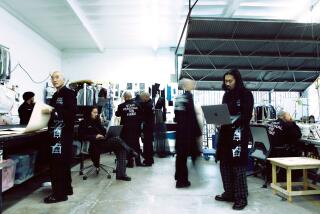Hickey-Freeman Suits Up to Take On the Trendies
- Share via
Hickey-Freeman has never sought out the trendies. But there comes a time when a clothier tires of being viewed as “an old-futz firm.”
That time has arrived for the 87-year-old Hickey-Freeman Co. of Rochester, N.Y., which seeks a “stronger image as a contemporary clothing company,” chairman Walter Hickey, grandson of founder Jeremiah Hickey, says.
On a recent visit to Bullocks Wilshire, Hickey said the customer profile for these establishment suits is “a 51-year-old, well-educated professional” who has a $75,000 income. “The only thing we’d like to change about that is the age,” he said.
But when a company makes suits that start at $600, it’s not an automatic leap into the youth market.
“Those are the people we have to convince to spend $600 on a suit as an alternative to a stereo or a weekend in Palm Springs,” he said.
To date, young fashion customers regard Hickey-Freeman as their fathers’ brand, he said, noting that the company is trying to change that perception through advertising. And with the licensing agreement in 1984 to produce and distribute Jaeger--a youthful, less-expensive line--Hickey hopes to hook a young man on Jaeger and see him graduate to Hickey-Freeman.
Men’s tailored clothing may be the least whimsical faction of the fashion industry but Hickey does see a change. The movement is toward all-season, all-occasion suits that travel well, he said. Most importantly, consumers want rich fabrics and no synthetics.
Cashmere and Wool
For fall at Hickey-Freeman, that translates to higher-loft fabrics--the use of cashmere and wool blends for suits as well as sport coats--and touches of woven color.
Silhouettes, however, remain the same. The 3 1/2-inch lapel still reigns, he said, and Hickey doesn’t expect much change until 1988--and then only if the economy is favorable. “It’s difficult, when the economy is slow, to introduce new styles.”
Hickey, who wore a chalk-stripe suit for an interview, also mentioned that fewer regional fashion quirks affect menswear sales these days.
Formalized Life Style
“The more formalized life style of the East is drifting this way,” he said, recalling that there was a time when the West Coast was noted for preferring flashy, shiny fabrics.
Hickey-Freeman, which has been a division of Chicago-based Hartmarx Corp. since the 1960s and reports annual volume sales of about $40 million, produces three traditional suit collections: the lightly padded-shoulder “boardroom,” the soft-shoulder “Canterbury” and a nipped-waist European style called the “continental.”






